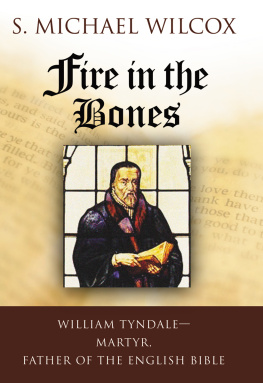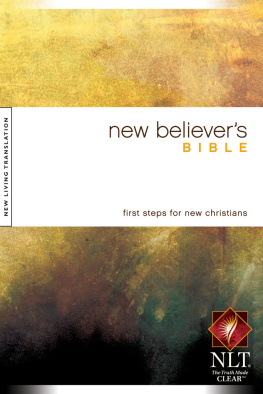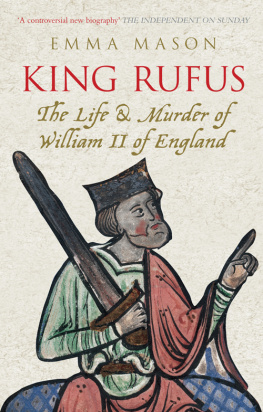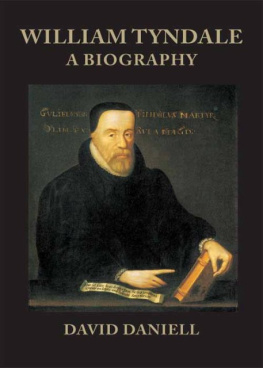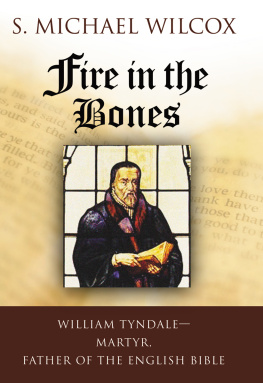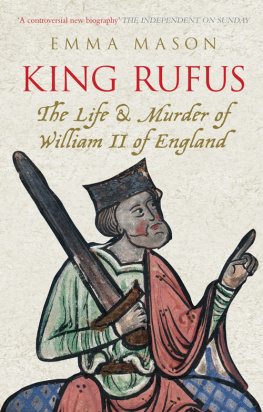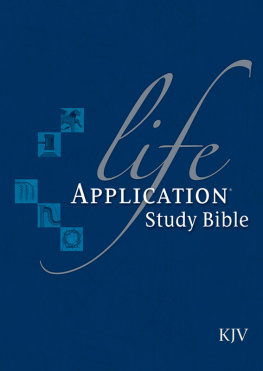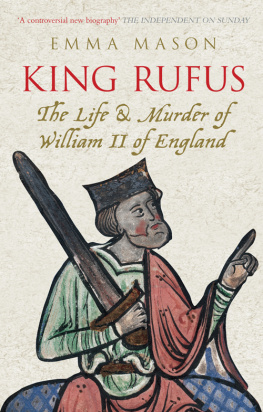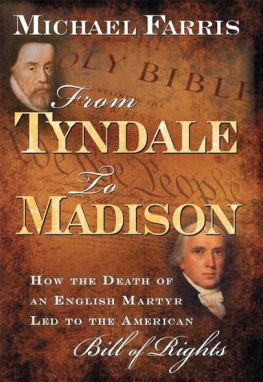Fire in the Bones
William Tyndale, Martyr, Father of the English Bible
S. Michael Wilcox
2004 S. Michael Wilcox.
All rights reserved. No part of this book may be reproduced in any form or by any means without permission in writing from the publisher, Deseret Book Company, P.O. Box 30178, Salt Lake City Utah 30178. This work is not an official publication of The Church of Jesus Christ of Latter-day Saints. The views expressed herein are the responsibility of the author and do not necessarily represent the position of the Church or of Deseret Book. Deseret Book is a registered trademark of Deseret Book Company.
All characters in this book are fictitious, and any resemblance to actual persons, living or dead, is purely coincidental.
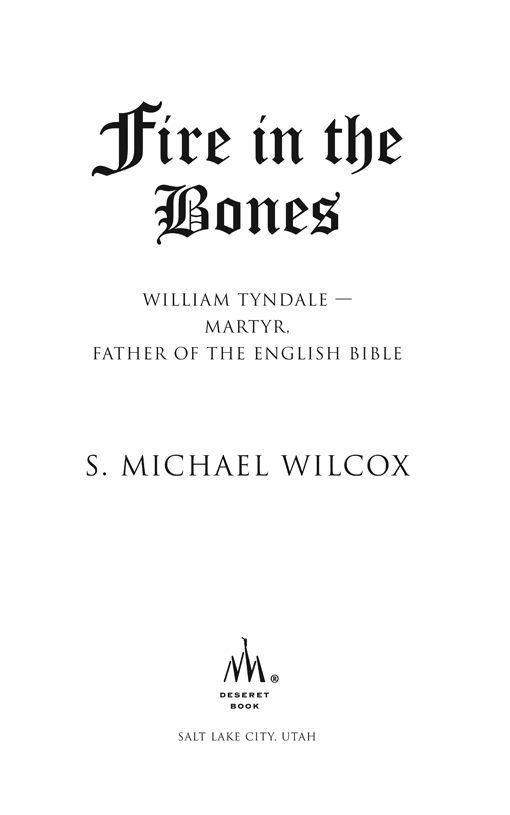
Wilcox, S. Michael.
Fire in the bones :William Tyndale, martyr, father of the English Bible /
S. Michael Wilcox.
p. cm.
Includes bibliographicalreferences and index.
ISBN-10 1-59038-297-8 (hardbound : alk. paper)
ISBN-13 978-1-59038-297-4 (hardbound : alk.paper)
eISBN 1-60641-630-8 (eletronic)
1. Tyndale, William, d. 1536. 2. ReformationEnglandBiography.
3. Bible. EnglishVersionsTyndale. I. Title.
BR350.T8W47 2004
270.6'092dc22
2004006273
Printed in the United States of America
Publishers Printing, Salt Lake City, UT
10 9 8 7 6
To Mavis and Farelyn,
dear English friends
Timeline
If God spare my life, ere many years I will cause a boy that
driveth the plough shall know more of the scripture than thou dost.
William Tyndale, to Gloucestershire cleric
138184: John Wycliffe translates theBible into English from Latin.
1408: TheConstitutions of Oxford forbid any English translation of the Bible.
1455: JohannesGutenberg prints the first book, the Bible, with movable type.
1494: WilliamTyndale is born in Gloucestershire.
15056: Tyndale begins studies atOxford.
1512: Tyndalereceives a bachelors degree at Oxford. He privately studies and teachesscripture.
1515: Tyndalereceives a masters degree at Oxford. Thomas Wolsey is appointed lordchancellor of England.
1516: Erasmuspublishes a Greek edition of the New Testament.
1517: MartinLuther launches the Reformation in Wittenberg, Germany.
151721: To further his scholarship,Tyndale moves to Cambridge, where he makes friends with futuremartyrs.
152123: Tyndale takes a job as atutor in Little Sodbury, where is he accused of heresy. He determines totranslate the Bible into English.
1524: Tyndaletravels to London and meets Humphrey Monmouth. He seeks permission fromBishop Tunstall to translate.
152425: Tyndale goes intoself-exile on the Continent. He flees to Cologne, Germany, withprinted portions of his New Testament.
1526: Tyndaleprints his first New Testament in Worms and begins smuggling books intoEngland. His translation is banned and burned in England.
1527: Englishagents begin looking for Tyndale on the Continent.
1528: Tyndalepublishes The Parable of theWicked Mammon and TheObedience of a Christian Man.
1529: SirThomas More becomes lord chancellor of England. More publishes his Dialogue Concerning Heresies,attacking Tyndale. Tyndale suffers a shipwreck, losing his translationsand books.
1530: JohnStokesley becomes bishop of London. Thomas Hitton is burned at the stake.Tyndale publishes the Pentateuch.
1531: ThomasBilney and Richard Bayfield are burned at the stake. Thomas Cromwellbecomes a powerful influence in the English court. Stephen Vaughanpromises Tyndale safe conduct to England. Tyndale writes An Answer to Sir Thomas MoresDialogue.
1532: JamesBainham is burned at the stake. Thomas More writes his Confutation, but Tyndale refusesto reply.
1533: ThomasCranmer is appointed archbishop of Canterbury. Anne Boleyn is crownedqueen of England. Tyndales dearest friend, John Frith, is burned at thestake.
1534: Tyndalepublishes his revised New Testament and the book of Genesis. He moves intoThomas Poyntzs house in Antwerp.
1535: Tyndaleis betrayed by Henry Phillips and arrested. Miles Coverdale publishes theentire Bible in English. Sir Thomas More is beheaded for treason.
1536: WilliamTyndale is strangled and burned at the stake in Brussels.
1537: JohnRogers publishes Matthews Bible.
1539: HenryVIII allows the Great Bible in every parish church in England. ThomasCromwell is executed.
1611: TheKing James Bible is published.
But his word was in mine heart
As a burning fire shut up in my bones,
And I was weary with forbearing,
And I could not stay.
Jeremiah 20:9
And if I prove a timid friend to truth, I am afraidthat I will not survive to be read by those to whom these times areancient.
Dante
Preface
The nature of Gods word is, that whosoever read it, or hear itreasoned and disputed before him, it will begin immediately
to make him every day better and better, till he be grown into a perfectman.
William Tyndale, Prologue upon the Gospel of St. Matthew
The Forgotten Apostle
Severaltourists were standing before the stone faces of
Mt. Rushmore when someone asked, Who are those guys anyway? A shocked silencegreeted the inquiry before someone answered, They are the faces of Americasgreatest presidents.
It seems inconceivable that anyone would fail to know thecontributions of Washington, Jefferson, Lincoln, or Roosevelt. Yet if therewere a Mt. Rushmore of the Restoration, would people consider it strange to seethe face of William Tyndale alongside the faces of Joseph Smith, Hyrum Smith,and Brigham Young? Next to those latter-day prophets, surely noindividual did more to prepare the way for the Restoration than WilliamTyndale. And though many biographies trace his life, he remains relativelyunknown to Latter-day Saints.
The opposition marshaled against him wasmountainous. From the brilliant Sir Thomas More to King Henry VIII, fromCharles V to the pope, the leading personalities of his century drew upon allof their resources to stop him. At a time when religious authorities condemnedheretics to death by fire, church and state hunted him relentlessly. More thana thousand years of cruelty, intolerance, and ignorance barred his way, but thecandle in his soul kindled a light sufficient to bring tens of millions totheir Savior.
With mustard-seed faith, William Tyndalelaid a critical foundation stone of the Restoration. His victory came shortlyafter his martyrdom, but by then he had fought many a battle that Joseph Smithwould not need to wage.
His name floats like a vague memory, his story unfamiliar,but without him and those few who fought the desperate conflict with him, theblack shadow of apostasy might still darken the world. He is the unknowndisciple, the forgotten apostle, the father of the Testaments, the creator ofthe prophetic and apostolic voice, the Elias of the European wilderness whosepersistent cry finally
triumphed and placed in our hands the bread of heaven, the manna of theWord.
This is his story.
April 4, 1519

